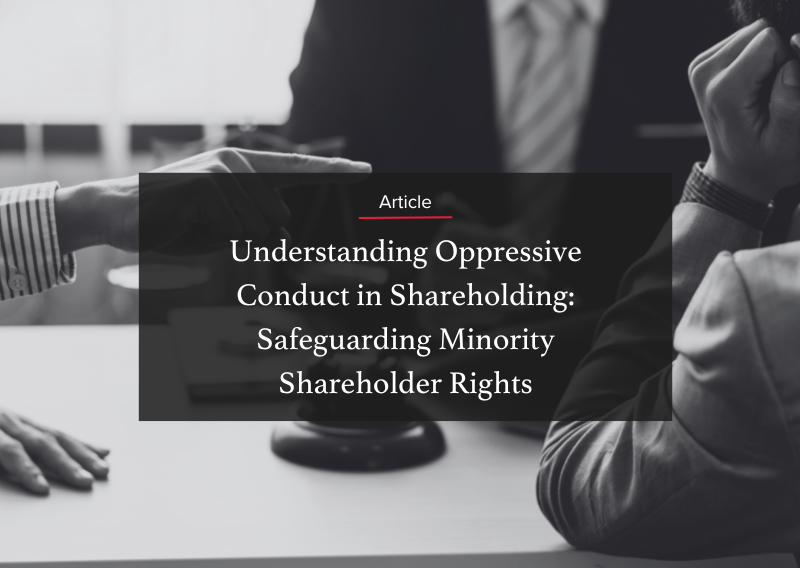Debunking the myths: Minority Shareholder Rights
Australia’s corporate law has traditionally emphasised majority rule, often leaving minority shareholders with little influence or control over the operations of a company. In the case of a falling out, this can make minority shareholders feel trapped, forced to accept whatever they are offered on exit. This perception is incorrect. This article explores the challenges faced by minority shareholders within the framework of Australian law, provides insights into the rights available to minority shareholders and the avenues open for recourse.
Risks Impacting Minority Shareholders
Minority shareholders often face a variety of risks that can significantly impact their investment and degree of influence within a company. Oppressive conduct by majority shareholders can include:
- Exclusion from critical business decisions.
- Forced removal as company director.
- Compulsion to sell shares below fair.
- Disproportionate sharing of company profits.
- Denial of information.
- Draining company profits through inflated salaries and bonuses to the majority.
- Failing to advise minority shareholder of official shareholder meetings.
- Locking minority shareholder out of company property.
- Using company funds to pay for majority shareholder expenses.
Understanding Oppressive Conduct
Under the Corporations Act 2001 (Cth)
The law aims to protect minority shareholders from being mistreated by the majority. When a minority shareholder faces oppression, the legislation provides remedies to protect their rights. To understand oppressive conduct, we must first understand its meaning under the law. Oppressive conduct is defined in section 232 of the Corporations Act 2001 (Cth) (Act). In accordance with section 232 of the Act, the court may make an order if:
At Common Law
Common law also evaluates oppressive conduct. It uses an objective test to determine if a ‘reasonable person’ would consider the conduct to be unfair. Courts have established that oppression involves a lack of integrity and can be burdensome, inequitable or unjust. It is not enough to just show prejudice or discrimination; there must be a clear element of unfairness that goes beyond disadvantage, and it must relate to the “affairs of the company,” which is broadly defined. This test weighs the interests of an individual member against those of the company as a whole.
Addressing Oppression in Shareholder Relations
Once oppressive behaviour is established, an order can be made for the oppressed shares to be bought by the oppressor, the majority shareholders, or the company itself. This is the most common solution as it creates a clean break between the parties. However, the courts have broad discretion to offer various remedies that do not reward ongoing oppressive conduct. These include:
(a) a receiver and manager being appointed, and/or the company being wound up;
(b) an injunction being granted against the company;
(c) an order compelling the majority to buy the shares of the minority; and
(d) orders for a director or minority shareholder to refrain from a specific act.
Protecting Minority Interests: The Court’s Stance in Slea Pty Ltd Case
In Slea Pty Ltd v Connective Services Pty Ltd (No 9) [2022] VSC 136, the court granted the oppressed minority shareholder, Slea Pty Ltd, the option to purchase the shares of the oppressor. This judgment was notable as it marked a first in Australia, highlighting the court’s dedication to ensuring fair compensation for the oppressed party. The court determined that it would be profoundly unjust for the oppressed party to be compelled to sell its shares for the benefit of the oppressor. As a result, the court exercised its discretion to issue a minority buyout order. The judge emphasised that such an order could serve to alleviate oppression and prevent oppressors from benefiting from their unjust actions.
Takeaways for Minority Shareholders
If you are a minority shareholder and are worried about the actions or conduct of the company, its directors, or majority shareholders, it is vital to address these concerns in a timely and proactive way. Engaging with a specialist early allows you to understand the various avenues available to you, ensures that you are well-informed about your rights and responsibilities, and increases your chances of achieving a favourable outcome without the need for legal proceedings.






